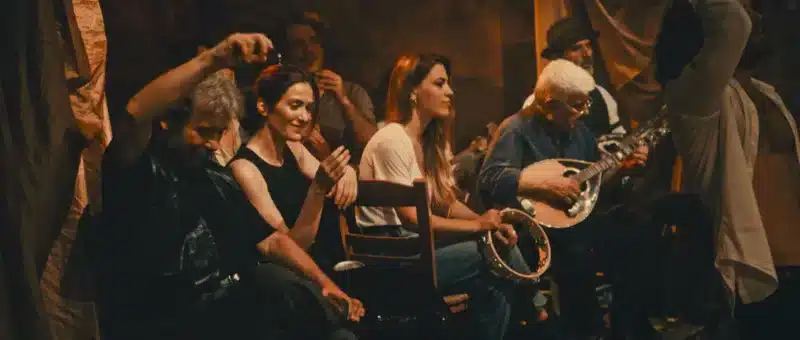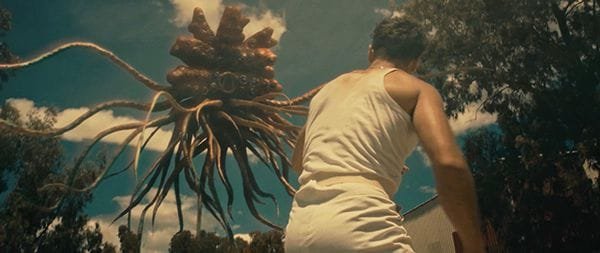
Minore (2023) is a great premise on paper, but – sadly – too diffuse and poorly-paced to pass muster in practice. Along the way, there are great scenes and great ideas, but the film’s ragtag approach to building tension and developing a plotline let it down. It could have been a great film, shorn of around half an hour or more, but director and co-writer Konstantinos Koutsoliotas has decided to treat his film as a wraparound for a whole range of characters, directors and even genres; that was his decision and them’s the breaks.
‘Armageddon is coming’, reads the placard of a lone, paddling penitent as a young sailor called William (Davide Tucci) arrives at a sleepy Greek town where he plans to take some shore leave. He has a specific motive for being here: he’s looking for his absent father, a musician, and he has a notion he may be in this town somewhere. In the meantime he gets settled in, staying at a local hotel and finding his way to a local taverna, as recommended by his, umm, friendly hotelier. Hitting it off with waitress Aliki (Daphne Alexander), he soon feels fairly welcome, even though he’s haunted by dreams of his absentee dad, a man he always sees in his mind’s eye playing a mysterious little number on his bouzouki. In and around this piece of relationship-building we get a run-through of a number of local characters, all of whom we’ll see again, but: the general plot-specific point here is that something strange is happening to this place. There are earth tremors, people are having bad dreams, there are disappearances and some people have taken to wading into the sea…
Time passes, and William thinks he just might have had a breakthrough in his search for his dad: there’s a certain man they call ‘Teacher’ who instructs the musicians at the taverna – but let’s move forward to around the hour mark. At this point, and not in any significant way before mind you, some of the strange portents start to come to something – the dreams, the rattling walls, the strange behaviour. Now, alien denizens emerge from the sea and besiege the taverna, giving us a Grabbers-style segment of the film (before a tension-splurging diaspora where they all disappear off elsewhere, but you get the idea). As such, the town residents will need to face down the tentacled menace and try to restore order.
The take-your-damn-time first act of this film is all character, character, character, to an extent that breaks the rhythm of the film; character fans may like the lengthy diversions where people discuss, for example, whether certain boys or girls are ‘clean’ or ‘dirty’ (bit of a weird aside, all of that). Apart from the reputational analysis, we get slivers of comedy, dramedy, crime, history, vignettes on Greek small town life and some slightly confusing interplays on who likes/knows who; there are lots of side-plots and mysterious predilections, in a nutshell, which keep us hanging around.
As for the creatures in this creature feature, Minore leans heavily on Lovecraftian horror and it does so from the outset: we get visual clues like framed paintings of tentacled entities, a sailor’s cap emblazoned with ‘Miskatonia’, and of course the beings themselves, calling to tiny human minds from the sea. It’s strange to me, though, that a film which works so hard to ground itself in Greece doesn’t opt for more vivid elements of Greek myth and legend; even if you accept the Lovecraftian premise that these cosmic entities pre-date humanity, it seems a shame to ignore the tentacled, and also multi-headed, winged, hooved, chimeric entities of Greek stories, which have the jump on HPL by a couple of millennia. Ancient Greece gets shoehorned in at some late point, true, but given the liberal amount of time afforded to so many other elements in the film, we could have had this done far more convincingly.
When things get going, and in those scenes where there is some kind of a monster showdown, Minore does make a decided effort to layer in plenty of gore and high weirdness which works well; budgetary constraints mean a lot of slightly dicey CGI but it’s all forgivable; hey, Dagon does the same thing and it’s still great, because any concerted effort to give the audience aggressive, head-popping monsters is always appreciated. But then, we also get so much padding and weakly comic dead ends which dilute the welcome gore. Sometimes, putting so much in a single film derails it, when what it really needs is to drive at its key points and best material in a straight line. That’s the case here, meaning that Minore, for all its strengths, scuppers most of the goodwill engendered by its momentary tentacles, flying eyeballs and splatter.
Minore (2023) screened at FrightFest 2023.
